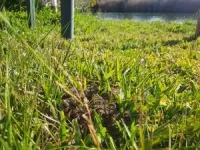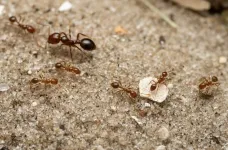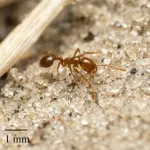(Press-News.org) WASHINGTON, Sept. 11, 2023 — What does it mean to have “cooked” something? Is heat the only way to break down proteins and transform raw ingredients? If you love ceviche, you know that’s not true … but how exactly does ceviche get “cooked?” No heat source is used, but it still undergoes a process in which proteins are denatured. We’re taking a closer look at proteins, how they denature and what that means for the food on your plate. https://youtu.be/Pw6apr3TBzY?si=RdIYP5j3B0daGtxw
Reactions is a video series produced by the American Chemical Society and PBS Digital Studios. Subscribe to Reactions at http://bit.ly/ACSReactions and follow us on Twitter @ACSReactions.
The American Chemical Society (ACS) is a nonprofit organization chartered by the U.S. Congress. ACS’ mission is to advance the broader chemistry enterprise and its practitioners for the benefit of Earth and all its people. The Society is a global leader in promoting excellence in science education and providing access to chemistry-related information and research through its multiple research solutions, peer-reviewed journals, scientific conferences, eBooks and weekly news periodical Chemical & Engineering News. ACS journals are among the most cited, most trusted and most read within the scientific literature; however, ACS itself does not conduct chemical research. As a leader in scientific information solutions, its CAS division partners with global innovators to accelerate breakthroughs by curating, connecting and analyzing the world’s scientific knowledge. ACS’ main offices are in Washington, D.C., and Columbus, Ohio.
To automatically receive news releases from the American Chemical Society, contact newsroom@acs.org.
Follow us: Twitter | Facebook | Instagram
END
How is ceviche ‘cooked?’ (video)
2023-09-11
ELSE PRESS RELEASES FROM THIS DATE:
American Heart Association recognizes UK’s Cassis for excellence in hypertension research
2023-09-11
LEXINGTON, Ky. (Sept. 11, 2023) — The University of Kentucky’s Vice President for Research and leading cardiovascular scientist is being recognized for her foundational work in the field of hypertension with a prestigious award from the American Heart Association (AHA).
Lisa Cassis, Ph.D., a professor in the College of Medicine’s Department of Pharmacology and Nutritional Sciences, has been continuously funded by the National Institutes of Health (NIH) since joining the UK faculty in 1988.
Cassis has led many multimillion-dollar projects, including serving as program director of an $11.3 million NIH-supported Center of Biomedical Research ...
The red fire ant is now established in Europe and could reach the UK
2023-09-11
A study published in the prestigious journal Current Biology, led by the Institute of Evolutionary Biology (IBE), a joint centre of the Spanish National Research Council (CSIC) and the Pompeu Fabra University (UPF), has identified 88 red fire ant nests spread over 5 hectares near the city of Syracuse, in Sicily, Italy. These are invasive colonies that could have come from China or the United States, where it is also an invasive species, according to the study's genetic analyses. This work, led by Roger Vila, a scientist at the IBE, with Mattia Menchetti as its first author, an INPhINIT ”la Caixa” ...
Healthy lifestyle can help prevent depression – and new research may explain why
2023-09-11
A healthy lifestyle that involves moderate alcohol consumption, a healthy diet, regular physical activity, healthy sleep and frequent social connection, while avoiding smoking and too much sedentary behaviour, reduces the risk of depression, new research has found.
In research published today in Nature Mental Health, an international team of researchers, including from the University of Cambridge and Fudan University, looked at a combination of factors including lifestyle factors, genetics, brain structure and our immune and metabolic systems to identify the underlying mechanisms that might explain this link.
According ...
Invasive red fire ants confirmed in Europe for the first time
2023-09-11
One of the most invasive species in the world is Solenopsis invicta, a red fire ant species with a painful sting. Native to South America, the ant has established itself across the globe. In an article publishing in the journal Current Biology on September 11, a group of ant experts confirm that the species has made its way to Sicily—the ant’s first official sighting in Europe. The ants could soon spread all over the continent, the researchers warn, which could cause major environmental, health, and economic problems in Italy and ...
Racial differences in clinical presentation in individuals diagnosed with frontotemporal dementia
2023-09-11
About The Study: The findings of this exploratory study suggest there are racial disparities in dementia severity, functional impairment, and neuropsychiatric symptoms. Future work must address racial disparities and their underlying determinants as well as the lack of representation of racially minoritized individuals in nationally representative dementia registries.
Authors: Lauren Massimo, Ph.D., of the University of Pennsylvania in Philadelphia, is the corresponding author.
To access the embargoed study: Visit our For The Media website at this link https://media.jamanetwork.com/
(doi:10.1001/jamaneurol.2023.3093)
Editor’s ...
Use of tenofovir alafenamide fumarate for HIV pre-exposure prophylaxis and incidence of hypertension, initiation of statins
2023-09-11
About The Study: In this study of people taking pre-exposure prophylaxis (PrEP) for HIV, tenofovir alafenamide fumarate (TAF) use was found to be associated with higher incident hypertension and statin initiation compared with tenofovir disoproxil fumarate use, especially in those 40 years or older. Continued monitoring of blood pressure and lipids for TAF users is warranted.
Authors: Adovich S. Rivera, M.D., Ph.D., of Kaiser Permanente Southern California in Pasadena, is the corresponding author.
To access the embargoed study: Visit our For The ...
Discovery of protein-protein interaction lays foundation for future glioblastoma therapy
2023-09-11
The discovery of a previously unknown molecular target has inspired what may become a therapeutic breakthrough for people with glioblastoma, the most common and aggressive brain cancer.
When people hear the word “cancer” they often picture a single mass, but glioblastoma cells are also highly invasive and spread quickly from the central mass, making it very difficult to fully eradicate. Even with current treatments such as temozolomide, the standard chemotherapy approved to treat glioblastoma, ...
The human lipidome reveals new indicators of health, disease and aging
2023-09-11
The sequencing of the human genome promised a revolution in medicine, but scientists soon realized that a genetic blueprint alone does not show the body in action. That required understanding the proteome – all the proteins, expressed by our genes, forming the cellular machinery that performs the bulk of the body’s functions. Now, another set of molecules known as the lipidome – all the lipids in our bodies – is filling in more details of human physiology.
Lipids are a broad category of small, fatty or oily molecules, including triglycerides, cholesterol, hormones ...
Auxin signaling pathway controls root hair formation for nitrogen uptake
2023-09-11
Plants have evolved diverse adaptive strategies to optimize the exploration of light and soil resources from their environments. One of the most prominent adaptive responses is the developmental plasticity of their root systems, which enables plants to efficiently forage nutrient pools that fluctuate in space and time. As a crucial component determining the active root surface, root hairs represent a powerful morphological trait to improve water and nutrient acquisition. Root hairs are extensions of epidermal cells that effectively enlarge the root surface area and facilitate soil exploration for water and nutrients. Root hair development starts with cell fate specification, which ...
Hobbies linked to lower depression levels among older people
2023-09-11
Having a hobby is linked to fewer depressive symptoms and higher levels of happiness, self-reported health and life satisfaction among people aged 65 and over, and this holds true across 16 countries on three continents, according to a new study led by UCL (University College London) researchers.
The study, published in the journal Nature Medicine, aimed to see if the benefits of hobbies were consistent in different national settings, and looked at data from 93,263 people aged 65 or over who had enrolled in five existing longitudinal studies in England, Japan, United States, China and 12 European countries.
Analysing data from participants spanning four to eight ...







